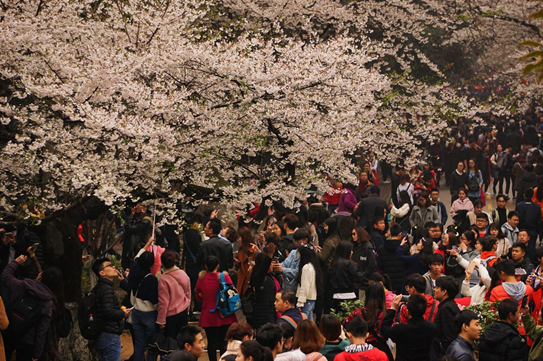In this rainy spring, cherry blossoms come as expected for their annual appointment with WHU. The charming scenery not only brings joy, but also arouses concerns about campus security. As an open university, WHU has been struggling to achieve a balance between openness and peace, especially during the Cherry Blossom Festival.
Welcome
Openness has been one of the principles to measure the comprehensive strength of universities. For WHU, openness means even more for the public. Mrs. Wang, who lives near WHU, says that to see the cherry blossoms is on her annual to-do list. “The cherry blossoms of WHU is well-known nationally. I think every taxpayer has the right to enjoy their beauty.” Mrs. Wang brought her friends this year, who came from afar to see cherry blossoms, “If the school shut the door to all tourists, we would definitely be disappointed.” In fact, other resources in WHU are also favored and occupied. Driving through the campus could be a shortcut when the traffic is heavy; strolling in the schoolyard is enjoyable; playgrounds are citizens’ favorite fitness places; canteens provide tasty food… It’s becoming inevitable to offer convenience when university chooses to open to the public.

Crowd gathered under cherry blossoms
However, students seem to be the group that are more or less disturbed by such openness. Senior student Zhang expressed her disaffection, “My cellphone was stolen in the tourist crowd during the Cherry Blossom Festival, and when I go to class, I have to take a detour because the gate I usually go through is closed.” She also complained about visitors’ bad behaviors, “Climbing trees, littering everywhere, leaving plates on the table after eating in the canteen… All these are quite annoying.” It’s not the first dispute over the openness of universities. Peking University temporally closed the gate in 2004 and gained public censure. Tsinghua University arranged specific visiting times for tourists. Xiamen University set the upper limit of visitors to 1000 people during work days.
Peace, how to achieve?
An official notice delivered by WHU before the Cherry Blossom Festival suggested for tourists to choose other attractions instead of WHU, thus making clear the attitude of the university. It’s not the first attempt of WHU to manage its daily order. From charging for entrance tickets to offering a live show of the cherry blossoms, WHU never really manages to diminish the enthusiasm of the public and has been searching for the right balance for a long time.
The most noticeable action was the implementation of a reservation system since last year. This year the upper limit of reservation is reduced to 10000, half of what it was before. “The reservation system is more regulated and has more effectively eliminated social disputes compared to prior years.” said Ma, a student on duty, “It works better in limiting the number of tourists. When you sell tickets you can hardly have an idea of how many people will enter today.” According to the statistics, nearly 200 thousand tourists flowed through WHU every day before the reservation system was carried out. Also, the reservation system refuses all kinds of group appointments in order to allow more individuals to visit, in a way, alleviating the pressure of campus security.

A guard having lunch
During the festival, the security department heightened security measures. Motor vehicles were strictly forbidden at the entrance, except for those who have registered in advance. To maintain the peaceful life of students, tourists are forbidden to enter any dormitory buildings. Also, additional security forces are arranged all over the campus in case of any emergency.

Volunteers collecting garbage
How to achieve a balance?
Although the reservation system is acknowledged by most people, its drawbacks cannot be ignored. Non-local visitors who know nothing about the reservation system can only return empty-handed. For the elderly who do not know how to reserve, the system also poses usability issues. “It is unfair,” said Ma, “I would feel disappointed if I came for the cherry blossoms but was refused.”
"The reservation system can still be improved.” said a staff from the security department, “A passenger flow monitoring system may be a choice. We can decide whether to let people in or not according to the real-time number of tourists, and people who have not reserved still have the chance to enter.”
Students also have their own opinions. Ma recommended a semi-reservation system. In this system, most people still make an appointment online, but the upper limit should be lower. The extra quota is for those who fail to reserve. “This may be a compromising solution.” he said.
However, behind the festival conflicts is the problem of guard management and more importantly, the public comprehension of “openness”. Some groups misconstrue openness as free entrance and exit of the university. However, true openness lies in a peaceful atmosphere where every curious mind is warmly welcomed. WHU is trying its best to achieve the balance between openness and peace, yet WHU also needs help and tolerance from the public. With the effort of both WHU and the public, a better WHU---one that is open and peaceful---will be achieved in the near future.
Photo by Chen Ziyao & Guo Yutong
Edited by Li Minjia, Sun Jingyi, Edmund Wai Man Lai and Hu Sijia